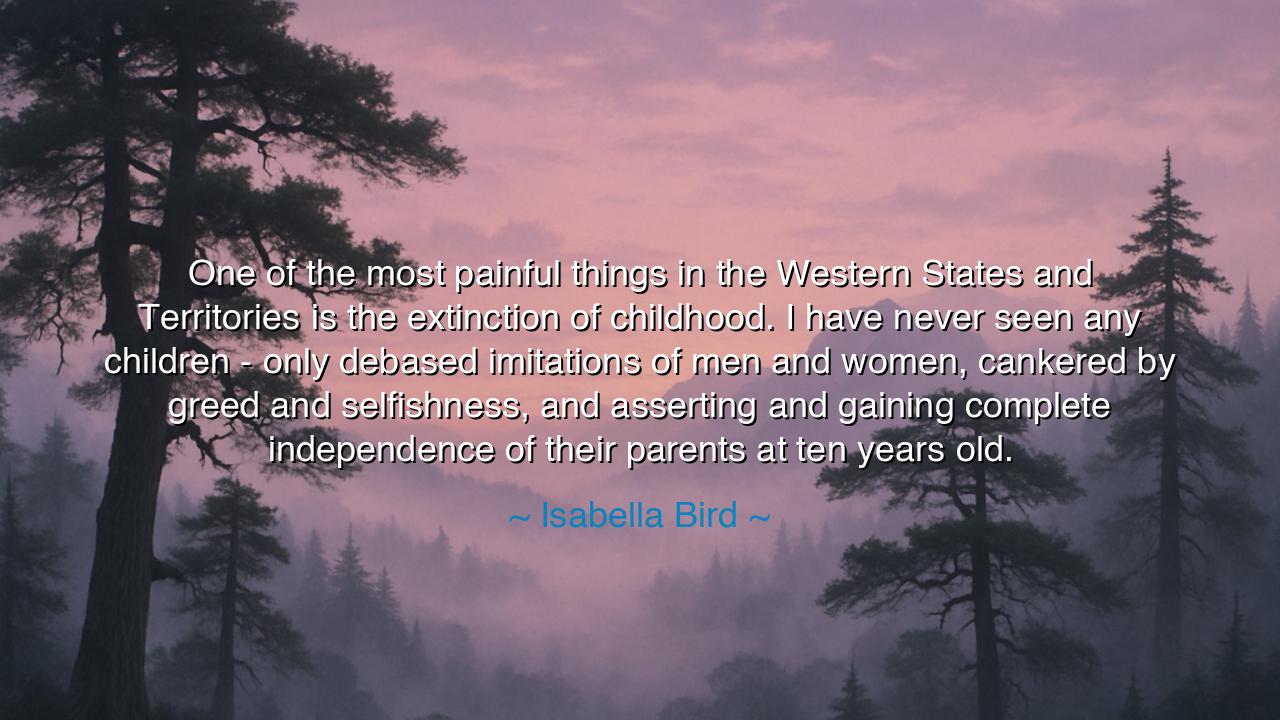
One of the most painful things in the Western States and
One of the most painful things in the Western States and Territories is the extinction of childhood. I have never seen any children - only debased imitations of men and women, cankered by greed and selfishness, and asserting and gaining complete independence of their parents at ten years old.






The words of Isabella Bird, that bold traveler and keen observer of the nineteenth century, pierce the heart with both sorrow and warning. When she wrote, “One of the most painful things in the Western States and Territories is the extinction of childhood. I have never seen any children—only debased imitations of men and women, cankered by greed and selfishness, and asserting and gaining complete independence of their parents at ten years old,” she was not merely lamenting the loss of innocence; she was mourning the corruption of the human spirit by the fever of materialism and premature independence. Her words, though born in the American frontier, echo through every age where the haste for progress consumes the purity of youth and the gentleness of upbringing.
To understand the origin of this quote, we must first understand Isabella Bird herself—a woman of courage and insight who journeyed across the wildest lands of her time. In the late 1800s, she traveled through the American West, that young, untamed expanse where ambition and survival ruled above all else. She encountered settlements filled with men and women hardened by labor, hunger, and the endless pursuit of wealth. There, among the dust and the echo of gunfire, she saw not the laughter of children but the weary mimicry of adults—young souls burdened too soon by the world’s harshness. Her lament was not only about the West but about the spiritual cost of a civilization that prized independence over innocence, and self-assertion over virtue.
Bird’s grief lies in the extinction of childhood, that sacred season of wonder when the heart is still open and unspoiled. In the frontier towns, she saw ten-year-olds who spoke like men, who worked like men, who schemed like men. They were “cankered by greed and selfishness,” she wrote, for they had been taught too early to prize possession and power. In their eyes she saw no dreams of play, no songs of imagination, only the restless hunger for gain. For her, this was a tragedy deeper than poverty—it was the death of purity in the soul, the silencing of that inner voice that still believes in beauty, kindness, and awe.
Her words remind us that independence, though noble, can become a curse when divorced from guidance and love. What Bird witnessed in those children was not the strength of self-reliance, but its distortion. True independence, she understood, grows from discipline, wisdom, and maturity—it is the fruit of nurture, not its replacement. But in the rough lands of the frontier, survival demanded that even the young bear the burdens of adulthood. The result was a generation stripped of wonder, growing old before their time, hardened by necessity and untouched by tenderness. Bird’s cry is not against independence itself, but against its premature and soulless form—the kind that replaces humility with arrogance and curiosity with cynicism.
There is an echo of her wisdom in the story of Charles Dickens, who as a boy labored in a blacking factory while his family languished in debtors’ prison. At an age when most children are shielded by innocence, Dickens was plunged into despair and humiliation. Yet, from this wound came compassion; from this darkness came light. He never forgot the extinction of childhood he saw among the poor of London—the same extinction Isabella Bird saw in the American West. Through his novels, he gave the forgotten children of the world a voice: Oliver Twist, David Copperfield, Little Nell—all became symbols of lost innocence struggling to survive in a merciless world. Like Bird, Dickens understood that when a society forces its children to become adults too soon, it forfeits its own humanity.
In the tone of the ancients, we may say: when childhood dies, the heart of a nation sickens. For it is in the laughter of the young that hope is reborn; it is in their play that imagination renews the earth. A people who lose reverence for childhood lose the capacity to dream. Bird’s warning transcends her time: in every age, there is a temptation to hurry children toward adulthood, to measure their worth by independence rather than innocence, to fill their hands before their hearts are ready. Yet every wise soul knows that the strength of a tree lies not in how quickly it grows, but in how deep its roots are allowed to take hold.
The lesson of Isabella Bird’s words is both tender and profound: independence without innocence is emptiness, and strength without compassion is decay. Childhood is not a weakness to be outgrown, but a sanctuary to be cherished—a time when the soul learns to trust, to wonder, and to love. To destroy it in the name of progress is to build a civilization without warmth, a future without heart.
And so, the practical path is this: protect the wonder in the young, and preserve it in yourself. Do not hasten their march toward the world’s hardness; let them linger in curiosity, in stories, in the simple joy of being alive. Teach them independence, yes—but also humility and tenderness. For only when strength is tempered by innocence can humanity remain whole. As Isabella Bird reminds us, civilization is not measured by its wealth or power, but by the light it keeps alive in the eyes of its children. Guard that light well, for when it goes out, the night that follows will be long and cold.






AAdministratorAdministrator
Welcome, honored guests. Please leave a comment, we will respond soon